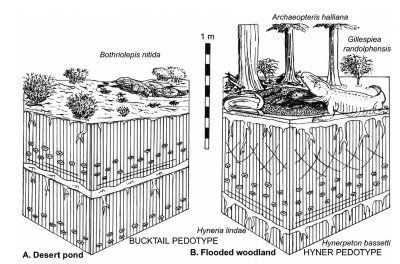New Theory: Fish Evolved Legs in Wooded Areas, Not Desert

Fish evolved into four limbed creatures in wooded areas, not the desert, according to a new theory by researchers citing the fossil record.
Contrary to the original desert theory proposed by Paleontologist Alfred Romer and more recent intertidal theory put forth by Grzegorz Niedbwiedzki at the University of Warsaw, University of Oregon scientist Gregory J. Retallack said that transitional forms between fish and amphibians lived in wooded floodplains.
Retallack said that the original desert theory seemed unlikely because "such a plucky hypothetical ancestor of ours probably could not have survived the overwhelming odds of perishing in a trek to another shrinking pond," and that the fish- tetrapod were not so much brave as resourceful.
Retallack challenged Romer’s theory by indicating that transitional fossils were not associated with drying ponds or deserts but were consistently found with humid woodland soils.
"Remains of drying ponds and desert soils also are known and are littered with fossil fish, but none of our distant ancestors. Judging from where their fossils were found, transitional forms between fish and amphibians lived in wooded floodplains. Our distant ancestors were not so much foolhardy, as opportunistic, taking advantage of floodplains and lakes choked with roots and logs for the first time in geological history," Retallack said.
Retallack’s theory also challenges Polish scientist, Niedbwiedzki’s theory that tetrapods had lived in shallow seas before they crawled onto land.
The intertidal theory was suggested by the Polish scientist in 2010 after they published their discovery of eight-foot-long, 395-million-year-old tetrapods in ancient lagoonal mud in southeastern Poland, according to a statement.
Retallack said that ancient soils and sediments at sites where transitional fossils are found are critical for understanding when and under what conditions fish first walked.
"The Darwin fish of chrome adorning many car trunks represents a particular time and place in the long evolutionary history of life on earth," Retallack added.
Published by Medicaldaily.com



























